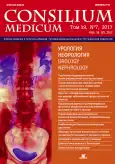The prediction of outcomes of the testicular biopsy in patients with azoospermia using clinical, endocrine and genetic factors
- Authors: Toropov V.A1, Borovets S.Y.1, Tkachuk V.N1
-
Affiliations:
- I.M.Pavlov First Saint Petersburg State Medical University of the Ministry of Health of the Russian Federation
- Issue: Vol 19, No 7 (2017)
- Pages: 83-85
- Section: Articles
- URL: https://bakhtiniada.ru/2075-1753/article/view/94892
- ID: 94892
Cite item
Full Text
Abstract
Full Text
##article.viewOnOriginalSite##About the authors
V. A Toropov
I.M.Pavlov First Saint Petersburg State Medical University of the Ministry of Health of the Russian Federation
Email: toropov-1990@mail.ru
аспирант каф. урологии с курсом урологии с клиникой ФГБОУ ВО «Первый СПбГМУ им. И.П.Павлова» 197022, Russian Federation, Saint Petersburg, ul. L'va Tolstogo, d. 6/8
S. Yu Borovets
I.M.Pavlov First Saint Petersburg State Medical University of the Ministry of Health of the Russian Federation
Email: sborovets@mail.ru
д-р мед. наук, проф. каф. урологии с курсом урологии с клиникой, ст. науч. сотр. НИЦ урологии НИИ хирургии и неотложной медицины ФГБОУ ВО «Первый СПбГМУ им. И.П.Павлова» 197022, Russian Federation, Saint Petersburg, ul. L'va Tolstogo, d. 6/8
V. N Tkachuk
I.M.Pavlov First Saint Petersburg State Medical University of the Ministry of Health of the Russian Federation
Email: urolog.kaf@mail.ru
д-р мед. наук, проф. каф. урологии с курсом урологии с клиникой ФГБОУ ВО «Первый СПбГМУ им. И.П.Павлова», засл. деятель науки РФ 197022, Russian Federation, Saint Petersburg, ul. L'va Tolstogo, d. 6/8
References
- Aziz N. The importance of semen analysis in the context of azoospermia. Clinics (Sao Paulo) 2013; 68 (1): 35-8.
- Esteves S.C, Miyaoka R, Agarwal A. An update on the clinical assessment of the infertile male. Clinics (Sao Paulo) 2011; 66: 691-700.
- Витязева И.И. Современные подходы к лечению азооспермии методом микро-ТЕСЕ в программе ЭКО/ИКСИ. Обзор литературы. Часть II. Проблемы эндокринологии 2013; 59 (5): 47-60.
- Esteves S.C, Agarwai A. The azoospermic male: current knowledge and future perspectives. Clinics (Sao Paulo) 2013; 68 (1): 1-4.
- Шуметов В.Г., Шуметова Л.В. Факторный анализ: подход с применением ЭВМ. Орел: ОрелГТУ, 1999.
- Хайкин С. Нейронные сети: полный курс. 2-е изд. М.: Вильямс, 2006.
- Krausz C, Quinatana-Murci L, Mc Elreavey K. Prognostic value of Y deletion analysis: What is the clinical prognostic value of Y chromosome microdeletion analysis? Hum Reprod 2000; 15 (7): 1431-4.
- Vogt P.H, Edelmann A, Kirsch S et al. Human Y chromosome azoospermia factors (AZF) mapped to different subregions in Yq11. Hum Mol Genet 1996; 5 (7): 933-43.
- Selice R, Di Mambro A, Garolla A et al. Spermatogenesis in klinefelter syndrome. J Endocrinol Invest 2010; 33: 789-93.
- Yarali Hakan. TESE-ICSI in patients with non - mosaic Klinefelter syndrome. RBM Online 2009; 18 (6): 756-60.
- Schiff J.D, Palermo G.D, Veeck L.L et al. Success of testicular sperm extraction and intracytoplasmic sperm injection in men with Klinefelter syndrome. J Clin Endocrinol Metab 2005; 90 (11): 6263-7.
- Wahlström T, Huhtaniemi I, Hovatta O, Seppälä M. Localization of luteinising hormone, follicle - stimulating hormone, prolactin, and their receptors in human and rat testis using immunohistochemistry and radio receptor assay. J Clin Endocrinol Metab 1983; 57: 825-30.
- Tesarik J, Martinez F, Rienzi L et al. In - vitro effects of FSH and testosterone withdrawal on caspase activation and DNA fragmentation in different cell types of human seminiferous epithelium. Hum Reprod 2002; 17 (7): 1811-9.
- Chausiaux O.E, Abel M.H, Baxter F.O et al. Hypogonadal mouse, a model to study the effects of the endogenous lack of gonadotrophins on apoptosis. Biol Reprod 2008; 78 (1): 77-90.
- Калинченко С.Ю. Мифы и правда о гиперпролактинемии. Избранные лекции. М.: Практическая медицина, 2014.
Supplementary files






